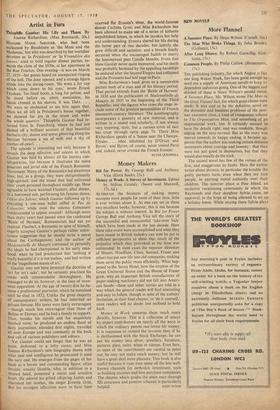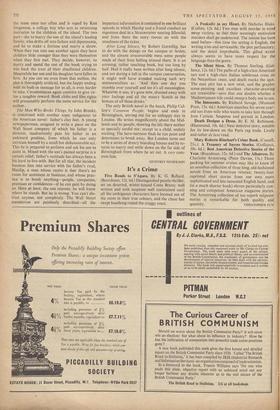NEW NOVELS
More Flannel
People. By Philip Callow. (Heinemann, 15s.) THE publishing industry, for which August is like one long Wakes Week, has been good enough to send out a supply of American novels to keep its dependent industries going. One of the biggest and shiniest of these is Sloan Wilson's second novel, A Summer Place. Mr. Wilson wrote The Man in the Gray Flannel Suit, for which great claims were made. It was said to be the definitive novel on the domestic and business problems of the post- war executive class, a kind of companion volume to The Organisation Man, and something of an inspirational work, too. It certainly seemed to have the details right, and was readable, though edging on the easy-to-read. But as the story was steered towards its happy ending, it became ap- parent that the author was making certain dubious statements about courage and honesty : that they were not just good in themselves, but that they would also usually do the trick.
The second novel has few of the virtues of the first, and exaggerates its faults. Here the author writes about divorce, in particular the trouble the guilty partners have, even when they are nice people, in exerting moral authority over their children. The summer place is Pine Island, an exclusive vacationing community to which the Raymonds and their daughter Sylvia come, on approval, in the hope of being allowed to set up a holiday home. While staying there Sylvia plays the tease once too often and is raped by Ken Jorgenson, a college boy who acts as swimming instructor to the children of the island. The two part—she to 'marry the son of the island's leading family, who drifts off into failure and dipsomania, and he to make a fortune and marry a shrew. When they run into one another again they have children little younger than they were themselves when they first met. They decide, however, to marry and spend the rest of the book trying to win back the trust of their disaffected children. Meanwhile her son and his daughter have fallen in love. As you can see even from that outline, the plot is thoroughly artificial, but the happy ending, with its built-in message for us all, is even harder to take. Circumstances again contrive to give vir- tue a tangible reward. Book clubs and film rights will presumably perform the same service for the author.
The Man Who Broke Things, by John Brooks, is concerned with another topic indigenous to the American novel : father's clay feet. A young newspaperman, assigned to write a piece on the Wall Street company of which his father is a director, inadvertently puts his father in an awkward position, from which he can only extricate himself by a small but dishonourable act. This he is prepared to perform and ask his son to assist in. Mixed with the son's pained surprise is a certain relief; father's rectitude has always been a bit hard to live with. But for all that, the incident bounces him into service with his father's rival, Haislip, a man whose motto is that there's no room for sentiment in business, and whose prac- tice is to break anything—people, companies, promises or confidences—if he can gain by doing so. Here at least, the son reasons, he will know where he stands. But he is wrong. You can't dis- trust anyone, not completely. The Wall Street manoeuvres are painlessly described—all the
important information is contained in one brilliant episode in which Haislip and a friend conduct an ingenious deal in a Stratocruiser nearing Idlewild; and from there the story moves on with the steadiness of the ticker.
After Long Silence, .by Robert Gutwillig, has to do with the doings on the campus at Arden, and the almost irrecoverable mess some people made of their lives helling around there. It is an amusing, rather touching book, but too long by half. Had it really been written after long silence, and not during a lull in the campus conversation, it might well have avoided making such wry sentimentalities as : 'And then one day you stumble over yourself and see it's all meaningless. Whatever it was, it's gone now, drained away with your feelings and all the watery Scotch at the liottom of all those drinks.'
The only British novel in the batch, Philip Cal- low's Common People, begins and ends in Birmingham, stirring out for an unhappy stay in London. He writes magnificently about the Mid- lands and its people, showing the life there neither as specially sordid nor, except to a child, unduly exciting. The hero-narrator finds he can paint and determines to break away. But London turns out to be a series of dreary boarding houses and he re- turns to marry and settle down on the far side of Birmingharil from where he set out. A very com- mon fate.
GEOFFREY NICHOLSON































 Previous page
Previous page